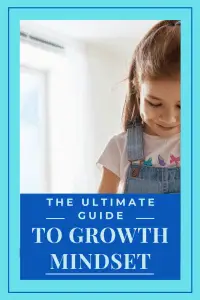Growth mindset has been the talk of the decade. I’m not one to follow trends but, this one is worth it! As parents, it’s our responsibility to create an environment where a growth mindset can flourish.
Table of Contents
So, What Is Growth Mindset?
A “growth mindset,” as Carol Dweck coined the phrase, is the belief that you can grow your mind. In her book- Mindset: The New Psychology of Success, she explains that while a “fixed mindset” assumes that our character, intelligence, and creative ability are static givens that can’t be changed. A growth mindset, however, thrives on challenge and sees failure “not as evidence of unintelligence but as a heartening springboard for growth and for stretching our existing abilities.“
“Believing that your qualities are carved in stone creates an urgency to prove yourself over and over. If you have only a certain amount of intelligence, a certain personality, and a certain moral character, well then you’d better prove that you have a healthy dose of them. It simply wouldn’t do to look or feel deficient in these most basic characteristics.“
Dweck believes a fixed mindset can negatively impact all aspects of your life. When you start viewing things as changeable, you can see the situation in a clearer picture.
A growth mindset is based on the belief that your basic qualities are things you can cultivate through your efforts.
Although people may differ in their initial talents and aptitudes, interests, or temperaments, and personalities, adults, children, including your students CAN change and GROW through application and experience. When you change your perspective, you can change what you strive for your view of success. Changing your definition of failure allows you to grow further. In this mindset, the hand you’re dealt is just the starting point for development.

Differences Between a Growth Vs Fixed Mindset
Here’s a list of traits for each type of mindset:
A Fixed Mindset Says:
- I like my work to be easy
- I don’t like to take on a challenge
- I want people to praise me for how clever I am
- I believe I cannot change how smart I am
- I don’t like to try new things because I won’t be very good at it
- I give up easily
A Growth Mindset (Positive Mindset) Says:
- I never give up
- I like my work to be difficult – it means I am learning
- I love challenges
- I want people to praise me for the effort I put into my work
- I believe I can get more intelligent by working hard
- I feel clever when I’m learning something new
- I learn from my mistakes

Simple Ways To Support Your Child’s or Student’s Growth Mindset
Ask open-ended questions when solving a problem
- What do you think will happen if…
- Why do you suppose…
These questions build a child’s critical thinking skills and lead to those enriching “lightbulb” moments.
Give specific feedback on what the child accomplishes
Moms (and most parents) love to use phrases like “you’re brilliant”, “you made that look so easy”, “you’re so clever” but praise like this doesn’t tell your child what they have done well. Comments like these just reinforce a fixed mindset in your child. Instead, use praises that target a specific action they’ve done like- “you sounded that word out really carefully and used your phonics – well done” or “I like how you kept going at swimming and tried to get all the way to the other side.”
Encourage kids to take risks (healthy ones of course)
Watch and listen to your child so you can take cues about what else they are ready to tackle. Vygotsky calls this the “zone of proximal development”. It’s when we gently nudge children to use what they know, to try something new (just a bit out of their reach, but developmentally appropriate.) By offering small but achievable challenges, they become more confident and persistent. Its one of the best ways to increase their self-esteem!
Be persistent and growth-orientated yourself
Try and narrate your thoughts or situations out-loud when you try something new or frustrating. This will give your child a chance to see you work through hard problems in a GROWTH way and with a healthy perspective. Try to avoid using fixed mindset terms when referring to yourself. So for example, you shouldn’t tell your child “oh, I’m horrible at such and such.”
This will give your children the message that you are either good at writing or not good at writing and there’s nothing you can do about it. On the other hand, using a growth mindset tone, you might say- “Such and such was tricky for me, but if you keep trying and learning from your mistakes, you’ll get there.“
Don’t sweat the small stuff
Accidents and mistakes happen. Show your child that there’s a lesson to be had when we don’t achieve what we set out to accomplish. It’s okay to switch direction, abandon a project for a bit or slow down. No matter what always remember to be specific about what worked, identify the emotions involved, offer encouragement for the next time and figure what the next steps are. Celebrate mistakes as growth because of the lessons learned. One consequence I’ve learned by not doing this, is that you risk allowing anxiety to manifest in your child or even yourself. So, be sure to focus on these things!
Mistakes = Marvelous Mistakes!

Access Your Child’s Mindset
Take some time to understand your child’s mindset and thoughts. Pen in some time every day to have chats with your children (this may look different for every child depending on the age but it’s relevant for any child from the age of 2+) Once you have an understanding of where your kids “head is at” you can work on shifting their perspective or supporting the mindset that’s growing.
Tangible “Hands-On” Actions To Take
- Make mistakes in front of your kids
- Have a positive reaction to those mistakes
- And openly reflect on what could be learned from the mistake. Try to show that it’s all about learning, not about being right.
- At mealtimes, talk about a time that you struggled with something and how hard it is and how you overcame it. Then ask your kids if there’s anything they struggled with, how they overcome it, and what they learned from the experience.
- Get excited when your child makes a mistake and help her think through what could be learned from it. Even mistakes that seem careless can be good learning opportunities. For example, if your child forgot to study enough for an important test, it might be an opportunity to learn about prioritization and to-do-lists.
Above all, remember this is and will always be an on-going process!
Growth Mindset Questions
- What did you do today that made you think hard?
- How will you challenge yourself today?
- What can you learn from this?
- What strategy can you use to get through this?
- Can you think of a mistake you made? How can you learn from this?
Click Here To Grab a FREE Sheet of Printable Questions Here
Support Growth Mindset With An Action Plan
Help children reconnect with a time when they learned something new that was a stretch or a challenge for them.
Point out the developmental nature of getting good. For example, we all go through the process of making a lot of mistakes, practicing, and then getting better. Help your children get curious about mistakes.
Help them reframe a mistake as new information or as a step in the process of learning. Also, help them incorporate self-correction in their own learning process.
Help children learn to hear their own fixed mindset voice too.
Capture and, in a gentle way, share their statements with them. Most kids are unaware of their self-talk because it’s gone on for so long (all subliminally). Bring that to their forefront awareness so you all can tackle and overcome the issue together.
- That girl is smart; she never tries and she always gets it
- I got it wrong again, I’ll never get this
Help your children talk back to negative self-talk with a growth mindset voice (i.e. give them language).
- I am willing to learn new skills to improve, and I know it will hard at times
- I get better and better with practice, this is hard but will get easier
- Model growth-mindset at every opportunity when you’re home!
Tell your child about a time when you didn’t know the answer to a recent question. Who did you ask for help? How did you learn the answer?
Or ask questions about their opportunities for learning and growth in the coming day or week. What questions do they need answers to? What do they want to learn, practice, and/or get better at today/this week?

The Right & Wrong Way To Give Praise
Don’t label yourself in ways that model a fixed mindset ( I’m a terrible cook….I was never good at math)
Shift your child’s attention to the process that led to the outcome. (i.e., cause-effect) Praise and value effort, practice, self-correction, and persistence. Don’t shelter your child from a failed task. Ask “What can you learn from this experience? What could you try differently the next time?”
Get curious about your child’s work through questioning & positive phrases:
- How did you figure that out?
- What’s another way you could have done that?
- How many times did you try before it turned out that way?
- What here was challenging and how did you figure it out?
- What do you plan to do next time?
- Wow!
- Look at that!
- Tell me about it
- Show me more
- Can you do it again without help?
- How did you do that?
- Let’s see what you did.
- How do you feel about it?
- How did you work that out?
- I see that you _________ (be specific)
- That looks like it took a lot of effort
- How many ways did you try it before it turned out the way you wanted it?
- What do you plan to do next?
- That looks like it took so much work.
- Are you pleased with what you did?
- What questions did you ask?
- Keep trying and you’ll get there.
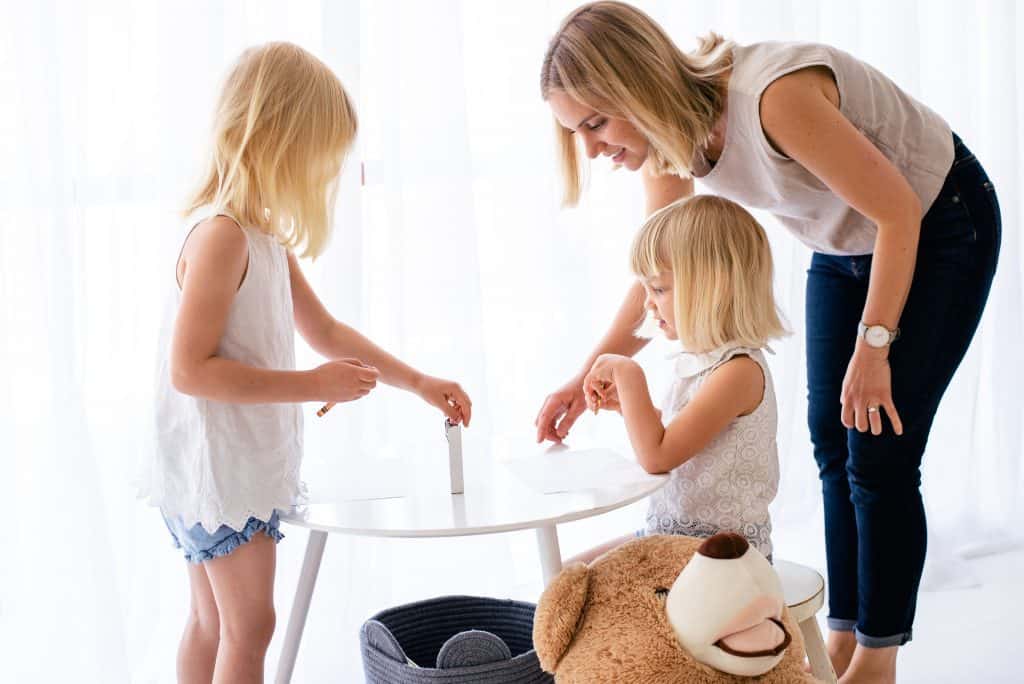
Access Your Mindset As A Mom
Recognize your own mindset
Be mindful of your own thinking and of the messages you send with your words and actions. This probably should have been the first point. Because, what if you realize that you don’t have a growth mindset? Where does that leave you? But more importantly, what can you do about it? So, for the sake of this article, I’m gonna get straight to it and assume you have a fixed mindset.
PS- no worries here. no judgment. I’m honestly right alongside you as I’ve walked down this road and continue to do so every day. its a work in progress.
Now if you have a growth mindset-awesome! Skip this section and move on the next. If not, let’s continue. First, I’m gonna share my best tips on how to revamp your mindset and then we can move forward to helping our kids. Yea? Okay, great.
Here are some tips:
Acknowledge and embrace your own imperfections
Hiding your weaknesses means you’ll never overcome them and you rob your kids’ chances to see YOU work through them (so they can learn too)
View challenges as opportunities
Embrace every opportunity to “fail”. This gives you and your children the ability to appreciate the journey more than the destination. Appreciate the inner growth and then people you become in the process.
Try something different
“There’s always another way!”
Dory, Finding Dory
The brain is not fixed and your mind shouldn’t be either. Stay connected with new research and data as it is discovered. (you know, for the naysayers)
Replace the word “failing” with the word “learning”
When you make a mistake or fall short of a goal, see it as a learning experience, not a failure.
Stop seeking approval
If you focus on others’ approval over learning, you’ll sacrifice your own potential for growth. Allow your kiddos to see you demonstrate a bold, unapologetic, leader attitude.
Value the process over the end result
People with a growth mindset perspective enjoy the learning process and don’t mind when it doesn‘t go exactly to plan.
Cultivate a sense of purpose
Dweck’s research showed that students with a growth mindset had a greater sense of purpose. But cultivating a growth mindset isn’t just for students. It benefits anyone willing to adapt. Moms and children alike. Keep the big picture in mind.
Celebrate growth with others
Share your progress with others, especially with your family. It’s an easy way to open the door to open communication.
Emphasize growth over speed
Learning fast isn’t the same as learning well, and learning well sometimes requires allowing time for mistakes.
Reward effort, not traits
Praise yourself when you’re doing something smart, not just being smart.
Redefine “genius“
Genius’ requires hard work, not talent alone!
Portray criticism as positive
Constructive criticism allows us (and our kids) to learn how to grow from the comments of others. Without becoming stagnant due to negative emotions that may arise from them.
Disassociate improvement from failure
Don’t assume that “room for improvement” equals failure. It doesn’t.
Provide regular opportunities for reflection
Allow yourself the opportunity to reflect on your learning at least once a day. Reflecting will cultivate an attitude of gratitude and naturally help rid any anxiety that rises up in your kids.
Place effort before talent
Hard work should always be rewarded before skills. Continue to acknowledge any struggles and validate their feelings.
Highlight the relationship between learning and “brain training”
The brain is like a muscle that needs to be worked out, just like the body. And like every other muscle in our body. It grows.
Cultivate “grit“
If you develop grit, you’ll be more likely to seek approval from yourself rather than others. And in turn, so will your kids
Abandon the image
“Naturally smart” sounds just about as believable as “spontaneous generation.” You won’t achieve the image if you’re not ready for the work.
Use the word “yet”
Dweck says “not yet” has become one of her favorite phrases. Whenever you see yourself struggling with a task, just remind yourself that you haven’t mastered it yet. This is one of the core basic concepts of creating a growth mindset. It’s with good reason! It is one of the best, fastest and easiest ways to shift negative mindsets.
Learn from other people’s mistakes
It’s not always wise to compare yourself to others, but it is important to realize that humans share the same weaknesses. If your children or students have siblings, encourage them to use their mistakes or setbacks as an opportunity to practice a positive mindset.
Make a new goal for every goal accomplished
No one will ever be done learning. Growth-minded people know how to constantly create new goals to keep themselves stimulated.
Take risks in the company of others
Stop trying to save face and give yourself permission to goof up now and then. It will make it easier to take risks in the future!
Think realistically about time and effort
It takes time to learn. Don’t expect to master every topic under the sun in one sitting. #imsuperguiltyofthis *shoulder shrug*
Take ownership over your attitude
Once you develop a growth mindset, own it! Acknowledge yourself as someone who possesses a growth mentality and be proud to let it guide you throughout your educational career.
Acknowledge and embrace imperfections
Hiding from your weaknesses means you’ll never overcome them.
View challenges as opportunities
Having a growth mindset means relishing opportunities for self-improvement.
Try different learning tactics
There’s no one-size-fits-all model for learning. What works for one person may not work for you (or your children.)
Keep up with brain plasticity research
Stay connected with new research and data as it is discovered and developed. (you know, for the naysayers)
Replace the word “failing” with the word “learning”
When you make a mistake or fall short of a goal, you haven’t failed; you’ve learned something new.
Stop seeking approval
When you prioritize approval over learning, you sacrifice your own potential for growth.
Value the process over the end result
Intelligent people enjoy the learning process and don’t mind when it continues beyond an expected time frame.
Cultivate a sense of purpose.
Dweck’s research also showed that students with a growth mindset had a greater sense of purpose. Keep the big picture in mind. You have a PURPOSE. You matter.
Celebrate growth with others
If you truly appreciate growth, you’ll want to share your progress with others.
Everything in life requires hard work, not talent alone!

Growth Mindset Journals for Kids & Moms
Cultivating a growth mindset doesn’t happen overnight. But, it certainly doesn’t take forever either. However, with diligence and opportunity, it’ll come MUCH faster. I’ve created a growth mindset journal for both myself and my littles after spending hours scouring the internet for suitable ones.
My kiddos are both under ten and I wanted something that would work for both a big toddler and a child. And I couldn’t find anything that
1. Didn’t cost an arm and leg for what I was getting in return and
2. Was suitable for BOTH of my kids and
3. Was complete with everything I needed and not just ABC, then having to purchase more products to fill the gaps.
So when I couldn’t find it, I created my own.
And because my readers are my favorite people (seriously, I appreciate you sticking around and listening to what I’ve got to say)
I want to gift them to you for an insanely low price. You won’t find this offer anywhere else>
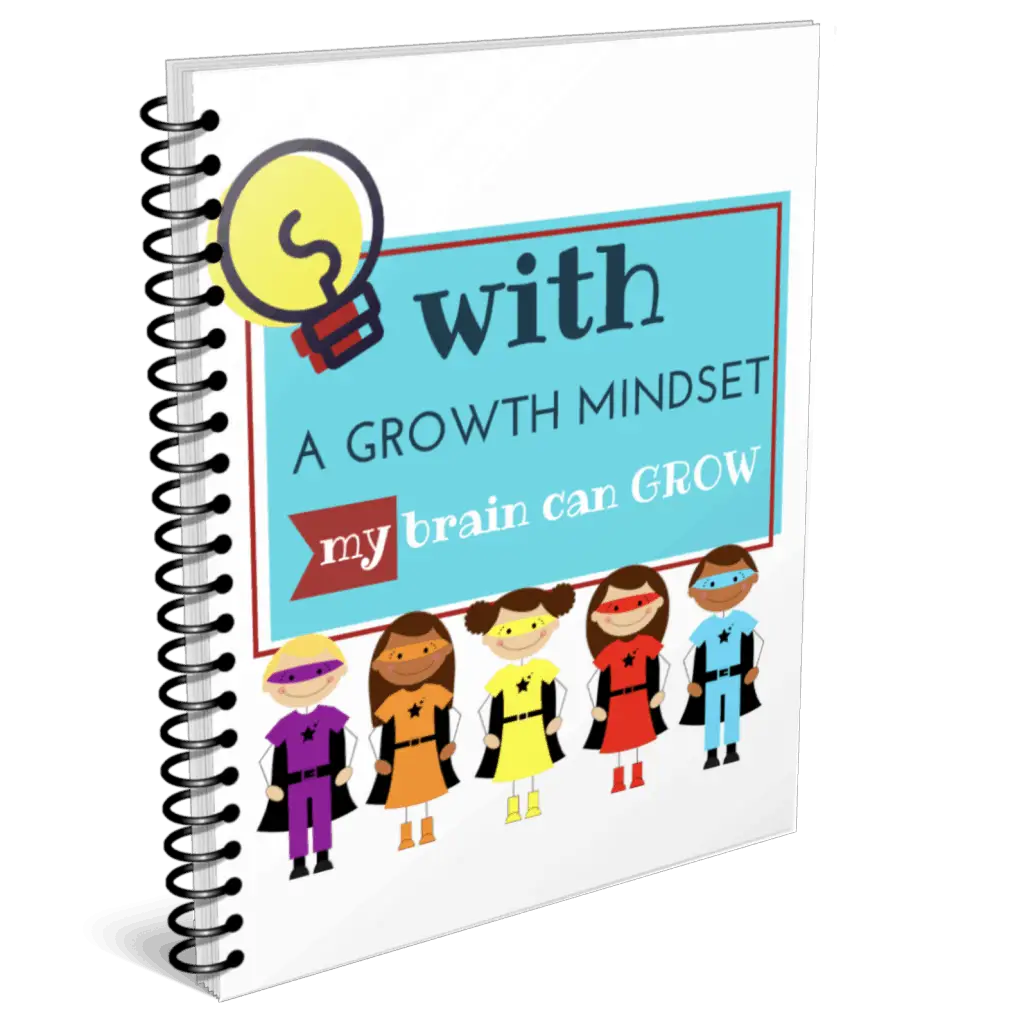
15 + Animated Growth Mindset Movies For The Family
- Inside Out: Story of a girl who harnesses her emotions in a positive way by growing through hardship
- Brave: Story of a princess who looks past tradition to see a new future
- Trolls: Story of creatures who have a positive outlook on finding the way out of their peril
- Finding Nemo: Story of a father who is persistent in then journey to find his son
- Finding Dory: Story of a daughter (fish) who is persistent in finding her parents
- Storks: A journey pf a human girl that stops at nothing to deliver another baby & return to where she belongs
- The Little Prince: Story of determined mother that enforces perfectionism on her daughter. A daughter fights to go against it and live a happy life
- Zootopia: Story of a determined rabbit to break tradition, barriers and glass ceilings to pursue her dream job
- Sing: Story of an elephant that overcomes her fear of public singing
- Moana: Story of a girl going against her culture to chase after old family traditions and finds purpose
- Coco: Story of a boy who longs to express his heart through music which goes against his family’s traditions only to find that his true longing is his family’s culture.
- Leap!: Story of a girl that’s determined to run after her dreams, no matter what it takes.
- Frozen: Story of a girl learning to control her magical powers and how it affects everyone around her.
- Up: Story of a husband determined to keep his promise to his wife no matter what.
- Wall-E: The journey of a robot who lives to clean a deserted world.
- Piper: Story of a reluctant bird that shies away from the status quo, only to discover he can redefine it.

Growth Mindset Books for Kids Under 10
Some of our family’s favorite growth mindset books are: (not necessarily in this order)
- My Beautiful Oops: This is a fantastic story of artwork gone “wrong”
- The Crayons That Quit:
- The Dot: A beautiful story of a girl that creates and finds her ability to be creative
There are a ton more- Click this post here for MORE GROWTH MINDSET BOOKS & summaries as well as direct links to the books.
Growth Mindset Posters
Here are some growth mindset posters for you FREE!
Videos to Understand How Growth Mindset Works
Here’s an introduction to the brain:
https://youtu.be/rf8FX2sI3gU
Understand Growth Mindset:
https://youtu.be/I2ttL1kgZRk
Understand The Neuroscience Behind It:
https://youtu.be/ELpfYCZa87g
Examples of Famous Failures That Support Growth Mindset:
https://youtu.be/zLYECIjmnQs
Growth Mindset VS Fixed Mindset:
https://youtu.be/75GFzikmRY0
Develop a Growth Mindset:
https://youtu.be/2zrtHt3bBmQ
“In one world, effort is a bad thing. It, like failure, means you’re not smart or talented. If you were, you wouldn’t need effort. In the other world, effort is what makes you smart or talented.”
Carol Dweck
87 Famous Failures That Support The Growth Mindset
- Ada Lovelace
- Amelia Earhart
- Audrey Hepburn
- Aung San Suu Kyi
- Bessie Coleman
- Betty Holberton
- Beyonce
- Billie Holiday
- Billie Jean King
- Danica Patrick
- Ellen Degeneres
- Florence Nightingale
- Frida Kahlo
- Harriet Tubman
- Helen Keller
- Indira Gandhi
- Jane Goodall
- J.K. Rowling
- Joan of Arc
- Julia Child
- Katherine Johnson
- Katie Ledecky
- Lindsey Vonn
- Lisa Leslie
- Lucille Ball
- Mae Jemison
- Malala Yousafzai
- Marie Curie
- Maya Angelou
- Mia Hamm
- Michelle Kwan
- Michelle Obama
- Misty Copeland
- Oprah Winfrey
- Rosa Parks
- Ruth Bader Ginsburg
- Sally Ride
- Serena Williams
- Simone Biles
- Sojourner Truth
- Sonia Sotomayor
- Whoopi Goldberg
- Wilma Rudolph
- Abraham Lincoln
- Alan Turing
- Albert Einstein
- Alexander Graham Bell
- Aristotle
- Arthur Ashe
- Barack Obama
- Benjamin Franklin
- Bill Gates
- Bruce Lee
- Cesar Chavez
- David Beckham
- Fred Rogers
- Henry Ford
- Ichiro Suzuki
- Isaac Newton
- Jackie Robinson
- Jesse Owens
- Jim Henson
- John McCain
- Leonardo Da Vinci
- Mahatma Gandhi
- Martin Luther King Jr.
- Michael Jordan
- Michael Phelps
- Muhammad Ali
- Neil Armstrong
- Pablo Picasso
- Peyton Manning
- Roberto Clemente
- Shel Silverstein
- Stan Lee
- Steph Curry
- Stephen Hawking
- Steve Jobs
- Steven Spielberg
- Thurgood Marshall
- Usain Bolt
- Allyson Felix
- Walt Disney
- Wayne Gretzky
- William Shakespeare
- Winston Churchill
- Wright Brothers
Growth Mindset Quotes From “Famous Failures”
You never fail until you stop trying.
Albert Einstein
NOthing is impossible. The word itself says “I’m possible”
Audrey Hepburn
If you’re feeling helpless, help someone.
Aung San Suu Kyu
Yes, we can.
Barack Obama
We do not need magic to transform our world. We can carry all the power we need inside ourselves.
J.K. Rowling
Click here for More Growth Mindset Quotes
How to Use The Power of Yet
The term “yet” as I’ve mentioned is such a powerful term. It releases this feeling of hope and positivity. As one can feel confident in the idea that they can grow, learn and discover new things.

How To Foster a Growth Mindset In Your Homeschool
Portray criticism as positive
You don’t have to use that hackneyed term, “constructive criticism,” but you DO have to believe in the concept.
Disassociate improvement from failure
Stop assuming that “room for improvement” translates into failure. It doesn’t.
Provide regular opportunities for reflection
Allow your kids to reflect on their learning.
Place effort before talent
Hard work should always be rewarded before inherent skills.
Highlight the relationship between learning and “brain training”
The brain is like a muscle that needs to be worked out, just like the body.
Cultivate grit
Kids with that extra bit of determination will be more likely to seek approval from themselves rather than others.
Abandon the image
Whatever prenotions your kids have worked up in their minds about being “smart,” Teach them to #Fahgeddaboutem.
Always add the term”yet“
Whenever you or your child hits a stumbling block or there’s something you can’t do. Remember “yet” and add that to the end of ALL your phrases. I can’t do such and such, YET.
Learn from other people’s mistakes
It’s almost never wise to compare yourself to others, but it is important to realize that everyone can learn from other people’s experiences and mistakes.
Make a new goal every time you accomplish a goal
Just like I tell my kiddos, we’re always students and we’ll never be done learning. Try not to toss a subject to the side simply because you aren’t required to “know” it anymore. Growth-minded people know how to constantly create new goals to keep themselves stimulated.
Take risks in the company of others
It’s easy to take risks when we’re alone and no one can judge us! Get comfortable taking risks around others as well.
Think realistically about time and effort
It takes time to learn. It takes time to pump out a quality project. Don’t expect to master every topic under the sun in one sitting.
Take ownership of your attitude
Once you develop a growth mindset, own it. Acknowledge yourself as someone who possesses a growth mentality and be proud to let it guide you throughout your life.
Modeling a growth mindset means being willing to try hard even when failure is likely because that’s when massive growth happens. For example, parents should try to get excited when their children make mistakes because these mistakes can reveal important gaps that should be filled.
When adults get excited about “learning” and making mistakes, children start to think of mistakes as a natural part of the learning process. (and leads to changes in learning behavior overall) Your children will become less likely to try and “sweep mistakes under the rug” because they’ll stop thinking of them as something to be ashamed of and see it as a learning experience.
Focus on Tasks that Require Perseverance
Never try to lower the standards for your children. Or “help” them too much. No one understands how easy this can be while homeschooling better than me. So be on the lookout for it. The last thing you want is to raise a child that feels entitled to easy work.
Now, I assume you’ve done this already but be sure to teach your child about how their brain works and how they can grow their brains. And if you need help doing this, be sure to grab our Growth Mindset Bundle for Kids from our shop.
Reflect On Your Own Biases
When you’re teaching your kids, it’s so easy to get frustrated with their inability to grasp a concept and revert to fixed mindset language. Like- “____ wasn’t born with it so I won’t waste my time. It’s easy for parents to hide their own lack of ability behind statements like these. So, it’s important to have honest reflections with yourself, and ideally with each other, about our own biases. Remember, it’s okay for your child to be stuck. That’s when the best learning is done. Praise effort and persistence.
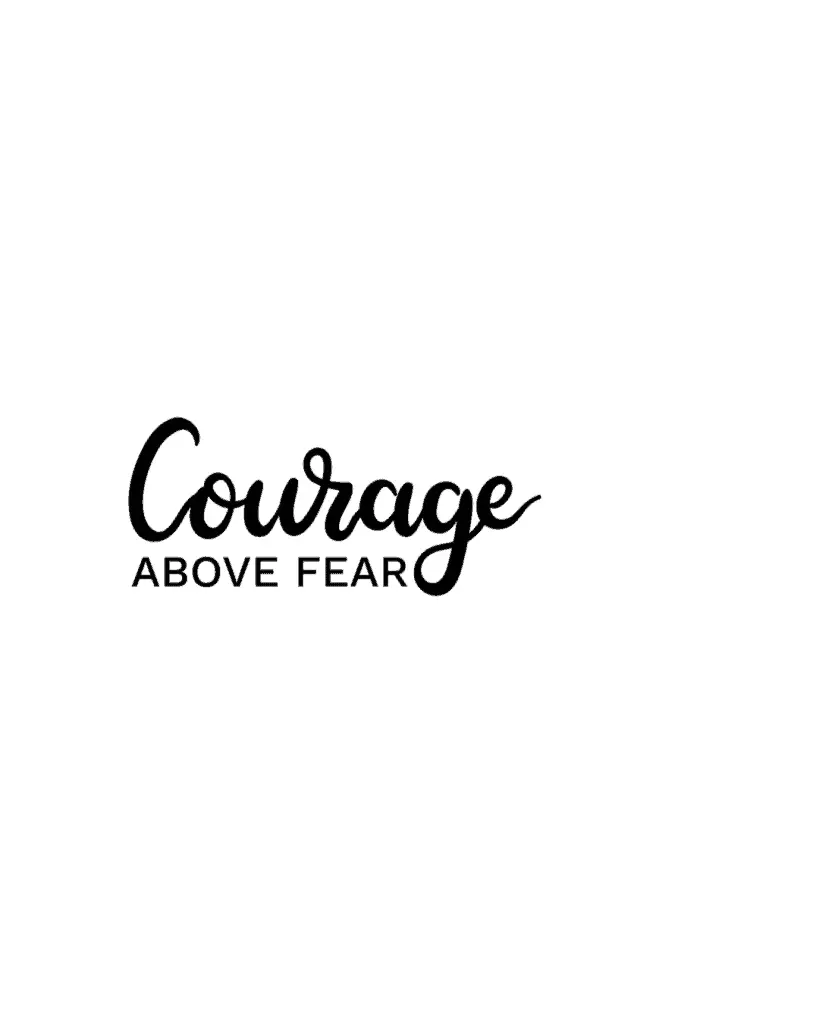
Best Affirmations to Teach Growth Mindset
We celebrate making mistakes – we can learn from them
We never give up – perseverance is the key if we are to succeed
We learn from each other
We don’t compare ourselves with others
We challenge ourselves and take risks
We remember that our brains are making new connections and growing all the time
Praise the amount of effort your child is putting into things rather than how clever they are
Talk to your children about their brain being like a muscle – the more they use it, the stronger it gets
Encourage your children to not give up if they are finding something difficult
Challenge your children to try something new
Growth Mindset Fun
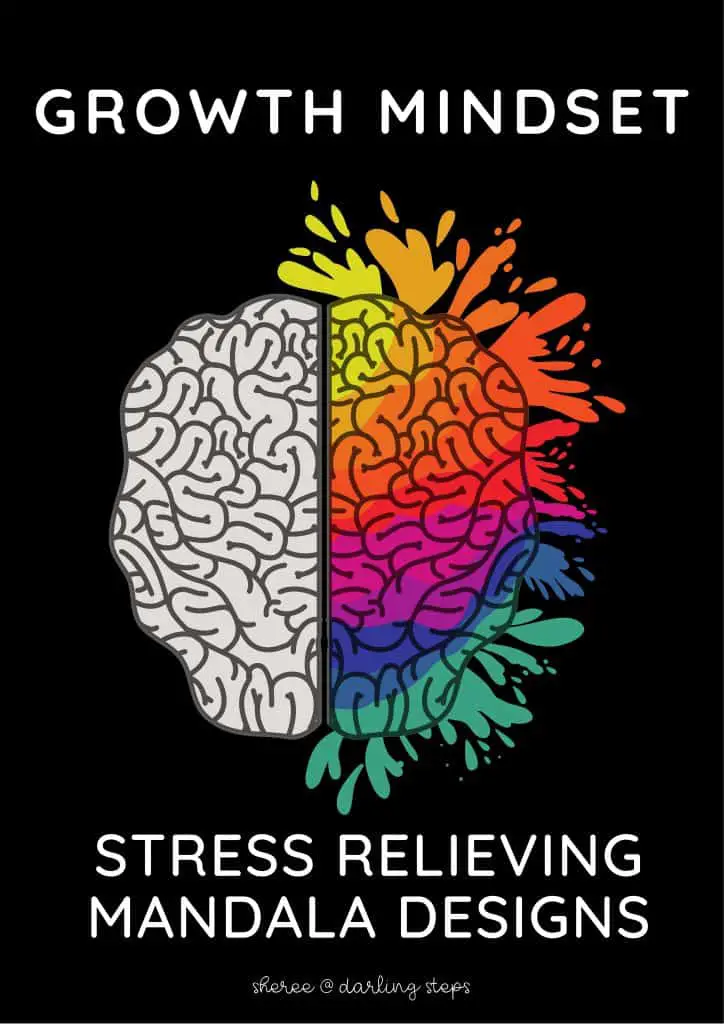
A beautiful 100-page coloring book!
You can purchase this Growth Mindset Coloring Book for Kids and Adults! here.
Is Growth Mindset Real Science or Pseudoscience?
I’ll be honest and say I’m still unsure. The funny thing about Pseudoscience is that it’s too “slippery” to disprove. And so, we have to let time reveal its truth. I’ve spent hours upon hours researching this topic. Here are a few articles worth reading that may pique your interest:
- This person isn’t sold on this mindset
Grab Your Growth Mindset Journal Now!
Growth mindset does not equal toxic positivity, rather it is the acceptance and realization that failure and challenges are a part of growth
